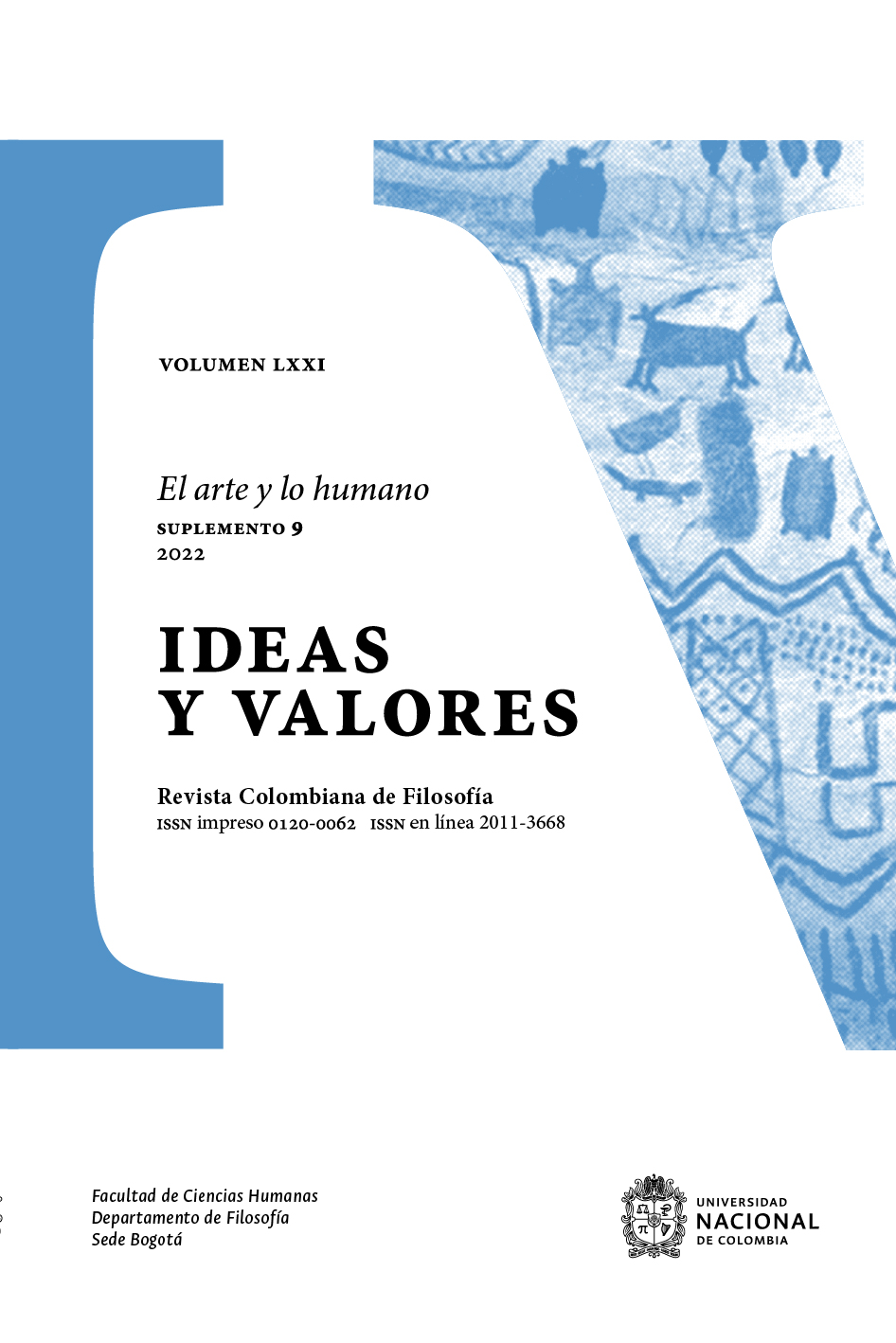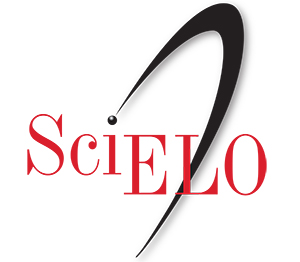Protestando contra todo lo que la belleza no es. O ¿por qué es tan bello el mundo?
Protesting Against Everything that Beauty is Not or, Why is the World so Beautiful?
DOI:
https://doi.org/10.15446/ideasyvalores.v71n9Supl.106747Keywords:
R. W. Kimmerer , É. Glissant, belleza, estética , decolonialidad (es)R. W. Kimmere, É. Glissant, beauty, aesthetics, decoloniality (en)
Downloads
En este texto reconstruyo una concepción decolonial de la belleza, a partir del pensamiento de Robin Wall Kimmerer y Édouard Glissant, de acuerdo con la cual la belleza constituye una condición del mundo que, no obstante, debemos cuidar. En estos dos pensamientos, provenientes de tradiciones diferentes, la belleza es tanto lo que se ve amenazado por el proyecto colonial occidental, como lo que permite su resistencia decolonial. Reconstruir la belleza del mundo es necesario y, sin embargo, imposible: su búsqueda implica no solo atender al llamado de las diferencias, sino también a las instancias en las que se niegan a ser escuchadas.
In this text I reconstruct a decolonial conception of beauty in the thought of Robin Wall Kimmerer and Édouard Glissant, according to which beauty constitutes a condition of the world that, nevertheless, we must tend to. For them, following different traditions, beauty is both what is threatened in the face of the Western colonial project, and what allows for a decolonial resistance. Reconstructing the beauty of the world is necessary, and ultimately impossible: the search for beauty involves not only attending to the cry of the differences, but also to the instances where differences refuse to be grasped.
References
Acosta-López, María del Rosario. “Gramáticas de La Escucha: Decolonizar La Historia y La Memoria.” Sujeto, Descolonizacion, Transmodernidad. Debates Filosóficos Latinoamericanos. Editado por Mabel Moraña. Iberoamericana/Vervuert, 2018.
Acosta-López, María del Rosario. “Hacia Una Gramática Del Silencio: Benjamin y Felman.” Los Silencios de La Guerra. Editado por Camila de Gamboa y María Victoria Uribe. Universidad del Rosario, 2017. 85-116. DOI: https://doi.org/10.2307/j.ctt1zxsksg.5
Figueroa, Víctor. Prophetic Visions of the Past: Pan-Caribbean Representations of the Haitian Revolution. Ohio State University Press, 2016. DOI: https://doi.org/10.2307/j.ctt22728sx
Glissant, Édouard. El discurso antillano. Fondo Editorial Casa de las Américas, [1981] 2010.
Glissant, Édouard. Introducción a una poética de lo diverso. Ediciones Del Bronce, [1996] 2002.
Glissant, Édouard y Patrick Chamoiseau. “Quand les Murs Tombent.” Manifestes. La Découverte, 2021a.
Glissant, Édouard y Patrick Chamoiseau. “L‘Intraitable Beauté du Monde.” Manifestes. La Découverte, 2021b.
Glissant, Édouard. Poética de la relación. Universidad Nacional de Quilmes, 2017.
Glissant, Édouard. Poetics of Relation. Traducido por Betsy Wing. University of Michigan Press, 1997. DOI: https://doi.org/10.3998/mpub.10257
Glissant, Édouard. Poétique de la Relation. Gallimard, 1990.
Glissant, Édouard. Tratado del Todo Mundo. El Cobre Ediciones, 2006a.
Glissant, Édouard. Une nouvelle région du monde. Gallimard, 2006b.
Gualdrón Ramírez, Miguel. “To ’stay Where You Are’ as a Decolonial Gesture: Glissant’s Philosophy of Caribbean History in the Context of Césaire and Fanon.” Memory, Migration and (De)Colonisation in the Caribbean and Beyond. Institute of Latin American Studies. University of London, 2020. 133-151.
Gualdrón Ramírez, Miguel. “Transversality as Disruption and Connection: On the Possibilities and Limits of Using the Framework of Trauma in Glissant’s Philosophy of Caribbean History.” Philosophical Readings 11.3 (2019): 152-162.
Kimmerer, Robin Wall. Una trenza de hierba sagrada. Capitán Swing Libros, 2021.
Loichot, Valérie. “Édouard Glissant’s Graves.” Callaloo 36.4 (2013): 1014-1032. DOI: https://doi.org/10.1353/cal.2013.0204
Monahan, Michael. Creolizing Hegel. Rowman & Littlefield, 2017.
Nesbitt, Nick. Caribbean Critique: Antillean Critical Theory from Toussaint to Glissant: Antillean Critical Theory from Toussaint to Glissant. Liverpool University Press, 2013. DOI: https://doi.org/10.5949/liverpool/9781846318665.001.0001
Táíwò, Olúfẹmi O. ́ Elite Capture: How the Powerful Took Over Identity Politics. Haymarket Books, 2022. DOI: https://doi.org/10.2307/j.ctv2g591sq
Taylor, Keeanga-Yamahtta. How We Get Free: Black Feminism and the Combahee River Collective. 2018. DOI: https://doi.org/10.14452/MR-070-08-2019-01_2
Wiedorn, Michael. Think Like an Archipelago: Paradox in the Work of Edouard Glissant. State University of New York Press, 2018.
Wynter, Sylvia. “Beyond the World of Man: Glissant and the New Discourse Od the Antilles.” World Literature Today 63.4 (1989): 637. DOI: https://doi.org/10.2307/40145557
How to Cite
MODERN-LANGUAGE-ASSOCIATION
ACM
ACS
APA
ABNT
Chicago
Harvard
IEEE
Turabian
Vancouver
Download Citation
License
Copyright (c) 2023 Los derechos son del autor(es), quien(es) puede re-publicar en parte o en su totalidad el documento ya publicado en la revista siempre y cuando se dé el debido reconocimiento a Ideas y Valores

This work is licensed under a Creative Commons Attribution-NonCommercial-NoDerivatives 4.0 International License.
The Creative Commons Attribution-NonComnercial-No Derivatives 4.0 Internacional License authorizes copying and redistributing the material in any means or format, provided that credit is granted to the authors and to Ideas y Valores as the source of the original publication. Copying or distributing the contents of the journal for commercial purposes is not allowed; neither is the adaptation, derivation, or transformation of the contents, without previous authorization by the authors and the editors of Ideas y Valores. For further information regarding the terms of this license, please consult http://creativecommons.org/licenses/by-nc-nd/4.0/legalcode.







1.jpg)
.png)


1.png)
.png)
.png)
.jpg)

.png)









